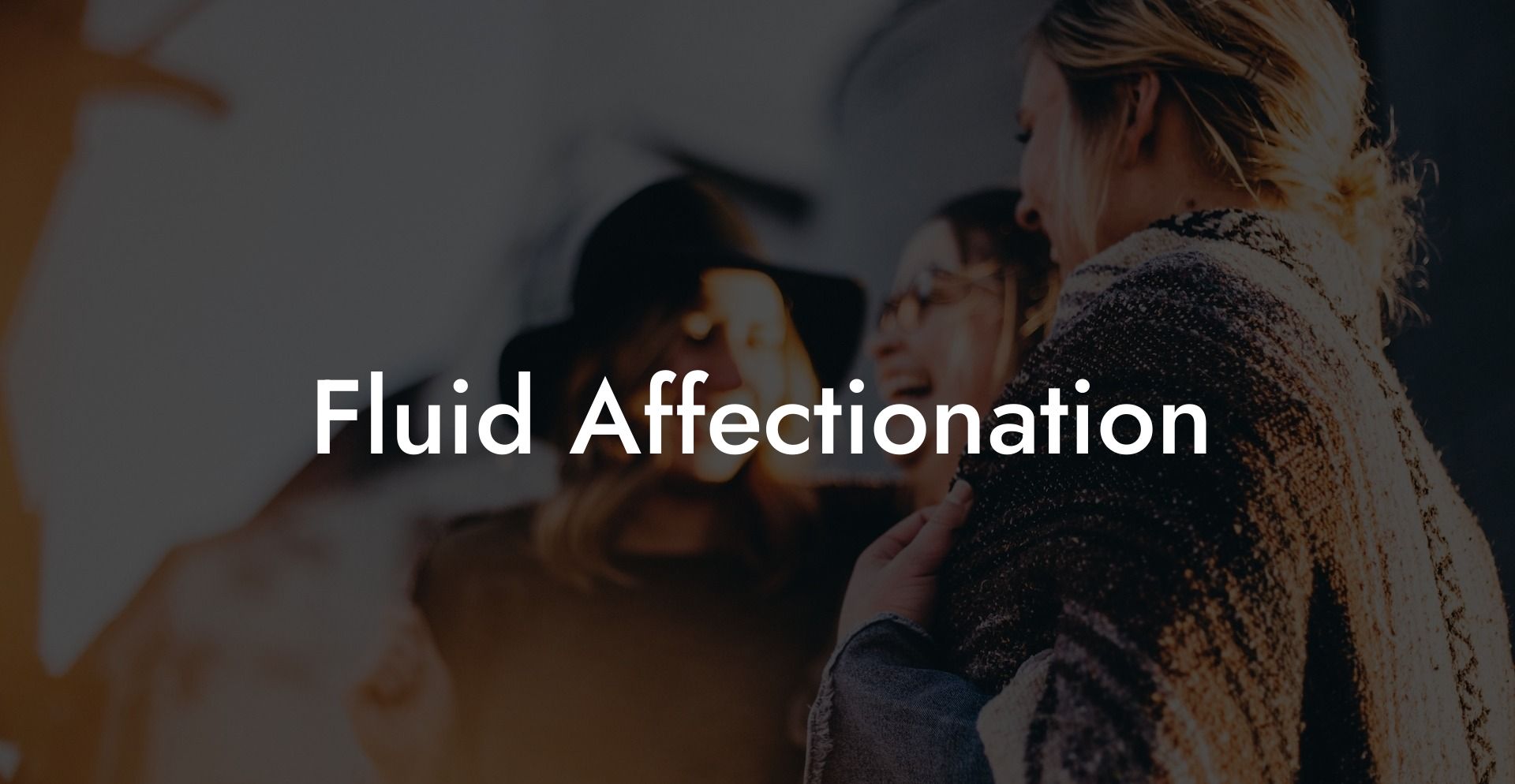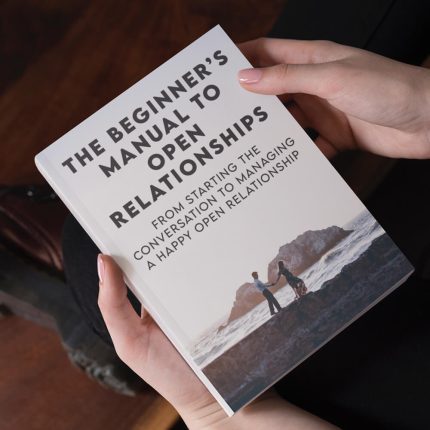Fluid Affectionation

Ever feel like your love life is a living, breathing piece of art—one that constantly reshapes itself with every heartbeat and every shared smile? Welcome to Fluid Affectionation, a cutting-edge term in ethical non monogamy that takes the idea of fluid, evolving love to a whole new level. Imagine a dynamic state where affection is not measured by fixed gestures or static routines, but flows and transforms like liquid art. Fluid Affectionation celebrates the unpredictable, ever-changing nature of emotional bonds, inviting you to embrace love as a vibrant, adaptable experience. Get ready to explore this groundbreaking concept, where every connection is as unique as a fingerprint and every emotional exchange is an opportunity to reinvent your relationship tapestry.
Have you ever wondered if monogamy is just a stupid little experiment? Open relationships, polyamory, relationship anarchy...find out which relationship dynamic suits you best with our one minute relationship test. See if you are just conforming to "societal norms". Reveal your truth >>
Quick Links to Useful Sections
- The Ethical Non Monogamy Term: Fluid Affectionation
- What Is Fluid Affectionation?
- Core Principles of Fluid Affectionation
- Historical and Cultural Perspectives on Fluid Affectionation
- From Rigid Roles to Liquid Love
- Cultural Shifts in Modern Love
- Everyday Dynamics of Fluid Affectionation
- Living a Love That Flows
- Integrating New Experiences
- Renegotiating Boundaries
- Benefits of Embracing Fluid Affectionation
- Deepened Emotional Connections
- Personal Growth and Self-Discovery
- Improved Communication and Conflict Resolution
- Flexibility and Resilience
- Challenges of Practicing Fluid Affectionation
- Managing Uncertainty and Change
- Balancing Flexibility with Stability
- Overcoming the Fear of Vulnerability
- Navigating External Judgment
- Frequently Asked Questions (FAQ)
- Resources and Community Support: Your Next Steps
The Ethical Non Monogamy Term: Fluid Affectionation
What Is Fluid Affectionation?
Fluid Affectionation is a term that encapsulates the idea of love and emotional connection as a continuously evolving, adaptable force within ethical non monogamy. It goes beyond the conventional notion of "affection" by recognizing that the ways we express and experience love can shift and transform over time. In this model, emotional bonds are not static; they ebb and flow, adapting to personal growth, shifting needs, and the diverse dynamics of multiple relationships. Think of it as love in its liquid form—always in motion, constantly reshaping itself, and effortlessly blending with the experiences of every partner.
At its core, Fluid Affectionation encourages you to let go of rigid expectations and to allow your emotional expression to be as dynamic as life itself. Whether you’re experiencing bursts of intense passion, quiet moments of deep connection, or periods of reflective calm, Fluid Affectionation honors every phase as an integral part of your journey.
Core Principles of Fluid Affectionation
- Adaptability: Emotions are never fixed; they evolve with you. Fluid Affectionation is all about accepting that your expressions of love can change as your circumstances and inner world evolve.
- Continuous Growth: Each interaction offers a chance for personal and collective growth. This approach encourages self-reflection and celebrates the evolution of your emotional bonds over time.
- Open Communication: Regular, honest dialogue is essential. Discussing your changing needs and feelings keeps everyone on the same page and reinforces mutual understanding.
- Mutual Empowerment: When every partner is free to express their affection in their own way, it fosters an environment where all individuals feel empowered and valued.
- Flexible Boundaries: Boundaries in Fluid Affectionation are not set in stone—they’re meant to be renegotiated as your emotional landscape shifts, ensuring that your relationships always reflect your current state of being.
Historical and Cultural Perspectives on Fluid Affectionation
From Rigid Roles to Liquid Love
Traditional models of love often painted affection as something fixed—a constant that could be measured by the frequency of kisses or the duration of shared glances. Over the decades, however, cultural shifts spurred by the sexual revolution, feminist movements, and the rise of ethical non monogamy have challenged these outdated notions. Fluid Affectionation emerged as a natural response to the recognition that human emotions are complex, multifaceted, and capable of remarkable transformation.
EXPLORE OUR ETHICAL NON-MONOGAMY & OPEN RELATIONSHIP SHOP
👨💻👩💻 Digital Store (Instant Download)
🍆💦 Clothing Store (Worldwide Delivery Available)
Fuck Each Other Not The Planet Unisex T-Shirt (Black)
$29.99It's Not Cheating If He Watches T-Shirt (Black)
$29.99Three Isn't a Crowd Unisex T-Shirt (White)
$29.99Real Men Share Pop Art T-Shirt (Black)
$29.99Fuck Each Other Not The Planet Unisex T-Shirt (White)
$29.99Sharing Is Caring Unisex T-Shirt (Black)
$29.99I Love Watching Pop Art T-Shirt (Black)
$29.99Multiple Lovers - Sharing Is Caring Unisex T-Shirt (Black)
$29.99Three Isn't a Crowd Unisex T-Shirt (Black)
$29.99I Love Watching Pop Art T-Shirt (White)
$29.99Real Men Share Pop Art T-Shirt (White)
$29.99Sharing Is Caring Daddy Cap (Black)
$39.99Early pioneers in non monogamy recognized that limiting love to a single, static form was both unrealistic and counterproductive. Instead, they embraced the idea that love, like water, adapts to its container—flowing into new shapes and forms as needed. This mindset paved the way for a more inclusive, expansive approach to relationships, one that values continuous evolution and personal authenticity.
Cultural Shifts in Modern Love
In today’s digital and globally connected world, our understanding of love has grown more nuanced than ever. Millennials and Gen-Z, in particular, are drawn to relationship models that honor fluidity and self-expression. Social media, online communities, and a wealth of relationship literature have all contributed to the spread of ideas like Fluid Affectionation, encouraging people to see love as a dynamic, ever-changing force rather than a static ideal.
This cultural evolution has led to the widespread adoption of flexible relationship practices in ethical non monogamy. People are increasingly willing to experiment with new ways of connecting, sharing, and growing together—making Fluid Affectionation a powerful tool for building resilient, adaptive relationships.
Everyday Dynamics of Fluid Affectionation
Living a Love That Flows
Imagine starting your day with a surge of energy and passion that gradually mellows into a peaceful, comforting warmth by nightfall. That’s the essence of Fluid Affectionation in your everyday life. It means that the way you express and experience love can vary from day to day, and even hour to hour, based on your mood, experiences, and evolving needs.
In practice, this might involve regular emotional check-ins, spontaneous acts of affection, or creative rituals that celebrate the fluidity of your connection. For example, you might set aside time for a weekly “heart-to-heart” session where you and your partners discuss your current feelings, revisit your boundaries, and share any new insights. These ongoing conversations help ensure that your relationships remain adaptive and responsive to change.
Integrating New Experiences
One of the most exciting aspects of Fluid Affectionation is the opportunity to incorporate new experiences into your love life. Whether it’s trying out a new hobby together, traveling to a new destination, or even engaging in a creative project as a group, every shared experience adds a fresh layer to your emotional connection. These moments not only enrich your relationships but also help you learn more about yourself and your partners.
Renegotiating Boundaries
As your emotional landscape evolves, so too should your boundaries. Fluid Affectionation requires that you remain flexible, willing to revisit and revise your agreements as needed. This might involve scheduling regular reviews of your emotional boundaries or simply having spontaneous conversations about how you’re feeling. Rather than viewing changes as setbacks, see them as opportunities to deepen your connection and ensure that every relationship reflects your true self.
Benefits of Embracing Fluid Affectionation
Deepened Emotional Connections
By embracing the fluidity of your emotions, you allow your relationships to develop in richer, more complex ways. Every shift in your emotional state adds a new layer to your connection, creating bonds that are resilient and deeply fulfilling.
- Layered Intimacy: Continuous evolution results in multi-dimensional relationships, where every phase contributes to the overall depth of your bond.
- Enhanced Trust: Open and adaptive communication builds trust, ensuring that everyone feels valued and understood.
Personal Growth and Self-Discovery
Fluid Affectionation encourages ongoing self-reflection and personal growth. As you learn more about your emotional needs and how they change over time, you become more empowered to express your true self. This journey of self-discovery not only enriches your relationships but also transforms you into a more confident and resilient individual.
- Increased Self-Awareness: Regular introspection helps you identify and articulate your evolving needs.
- Mutual Empowerment: As each partner grows, the entire relationship network becomes more supportive and dynamic.
Improved Communication and Conflict Resolution
The commitment to fluid, ongoing dialogue in Fluid Affectionation leads to better communication skills. This, in turn, makes it easier to resolve conflicts constructively and prevent misunderstandings from snowballing into larger issues.
- Proactive Check-Ins: Scheduled conversations help you address issues before they escalate.
- Effective Dialogue: Open and honest communication fosters a culture of trust and respect.
Flexibility and Resilience
One of the greatest strengths of Fluid Affectionation is its inherent flexibility. This adaptability enables your relationships to thrive even in the face of change, ensuring that your emotional bonds remain strong and supportive regardless of external pressures or internal shifts.
- Adaptive Boundaries: Flexibility in your agreements allows your relationships to evolve in tandem with your emotional growth.
- Resilient Network: An adaptable support system can better handle life’s ups and downs, providing stability amidst change.
Challenges of Practicing Fluid Affectionation
Managing Uncertainty and Change
The fluid nature of your emotions can sometimes lead to uncertainty. The unpredictability of how your feelings will evolve might be unsettling, and it requires a mindset that embraces change as a natural part of growth.
- Tip: View uncertainty as an opportunity for new experiences rather than a threat, and practice mindfulness to stay grounded.
Balancing Flexibility with Stability
While flexibility is a core strength, it can also create challenges if there isn’t a stable foundation. Striking the right balance between adaptability and consistency is key.
- Tip: Establish core routines or traditions that provide a stable emotional base, even as other aspects of your relationships evolve.
- Tip: Regularly review and adjust your boundaries to maintain equilibrium between change and consistency.
Overcoming the Fear of Vulnerability
Embracing Fluid Affectionation requires a willingness to be vulnerable, which can be daunting if past experiences have left you guarded. The fear of exposing your true self may sometimes hinder your ability to fully embrace change.
- Tip: Start with small, manageable acts of vulnerability and gradually build trust through open dialogue and self-compassion.
- Tip: Consider professional counseling if you find it particularly challenging to let go of your defenses.
Navigating External Judgment
Despite the growing acceptance of fluid relationship models, you may still encounter criticism from those who cling to traditional ideas of love. External judgment can sometimes create self-doubt or pressure to conform.
- Tip: Build a supportive network of like-minded individuals who celebrate diverse, evolving connections.
- Tip: Educate others when you feel comfortable, but always prioritize your own growth and authenticity over external opinions.
Frequently Asked Questions (FAQ)
1. What is Fluid Affectionation in ethical non monogamy?
Fluid Affectionation is the idea that emotional bonds are fluid and ever-evolving. It emphasizes that love and affection can change, adapt, and deepen over time as individuals grow and relationships develop.
2. How does Fluid Affectionation differ from traditional affection?
Traditional affection is often viewed as a constant, unchanging expression of love, while Fluid Affectionation embraces the dynamic, shifting nature of emotions—acknowledging that feelings can evolve with experience and time.
3. What are the core principles of Fluid Affectionation?
The core principles include adaptability, continuous personal and collective growth, open communication, mutual empowerment, flexible boundaries, and a commitment to embracing change.
4. How can Fluid Affectionation deepen emotional connections?
By allowing your emotional bonds to evolve naturally, you build layered connections that become richer over time. Continuous communication and the willingness to adapt strengthen trust and intimacy.
5. What benefits does Fluid Affectionation offer?
Benefits include deeper emotional intimacy, enhanced personal growth, improved communication, increased flexibility, and a resilient support network that adapts to life’s changes.
6. What challenges might arise with Fluid Affectionation?
Challenges include managing uncertainty, balancing flexibility with stability, overcoming the fear of vulnerability, and navigating external judgment or traditional expectations.
7. How important is communication in Fluid Affectionation?
Communication is crucial. Regular check-ins, honest dialogues, and adaptive boundary-setting are key to ensuring that your emotional connections continue to grow and evolve.
8. Can Fluid Affectionation be applied to both monogamous and non monogamous relationships?
Yes, the concept of Fluid Affectionation is about the natural evolution of emotional bonds and can enhance any relationship model that values growth, openness, and adaptability.
9. What strategies can help manage the uncertainty of evolving emotions?
Embrace mindfulness practices, set adaptive boundaries, and maintain regular self-reflection and communication to transform uncertainty into a catalyst for growth.
10. How do shared experiences contribute to Fluid Affectionation?
Shared experiences add new layers to your emotional connections, deepening your bonds and reinforcing the dynamic, ever-changing nature of your relationships.
11. How can I overcome the fear of vulnerability in Fluid Affectionation?
Start by taking small steps towards sharing your feelings, practice self-compassion, and gradually build trust through open, supportive dialogue with your partners.
12. Where can I find additional resources on Fluid Affectionation?
Additional resources include books like The Ethical Slut by Dossie Easton & Janet Hardy, podcasts such as Multiamory, and online communities like r/polyamory that focus on ethical non monogamy and dynamic relationship practices.
Resources and Community Support: Your Next Steps
- The Ethical Slut by Dossie Easton & Janet Hardy – A seminal work offering insights into ethical non monogamy and the evolving nature of love.
- Podcasts: Listen to Multiamory and related podcasts for expert advice, personal stories, and strategies on nurturing evolving relationships.
- Online Communities: Engage with forums like r/polyamory to share experiences and gain support from others who value fluid, evolving emotional bonds.
- Workshops and Webinars: Attend events on relationship psychology and ethical non monogamy to deepen your understanding and build your network.
- Therapy and Counseling: Consider professional guidance to help navigate the complexities of evolving emotions and maintain effective communication in your relationships.
By exploring these resources and implementing the strategies outlined in this guide, you can embrace Fluid Affectionation as a transformative way to view and nurture your relationships. Celebrate the evolution of your emotional bonds, adapt gracefully to change, and let your love flow freely into a vibrant, ever-changing masterpiece of connection.
EXPLORE OUR ETHICAL NON-MONOGAMY & OPEN RELATIONSHIP SHOP
👨💻👩💻 Digital Store (Instant Download)
🍆💦 Clothing Store (Worldwide Delivery Available)
Three Isn't a Crowd Unisex T-Shirt (Black)
$29.99Sharing Is Caring Daddy Cap (Black)
$39.99I Love Watching Pop Art T-Shirt (Black)
$29.99Multiple Lovers - Sharing Is Caring Unisex T-Shirt (Black)
$29.99It's Not Cheating If He Watches T-Shirt (Black)
$29.99Real Men Share Pop Art T-Shirt (Black)
$29.99I Love Watching Pop Art T-Shirt (White)
$29.99Sharing Is Caring Unisex T-Shirt (Black)
$29.99Fuck Each Other Not The Planet Unisex T-Shirt (White)
$29.99Three Isn't a Crowd Unisex T-Shirt (White)
$29.99Real Men Share Pop Art T-Shirt (White)
$29.99Fuck Each Other Not The Planet Unisex T-Shirt (Black)
$29.99Lost & confused by all of the terms, types and seemingly made up 3 letter acronyms?? We've got you. Check out our Ethnical Non-Monogamy Dictionary >>
Useful Interruption: Not sure which relationship vibe fits you best? Take our Relationship Test, it’ll give you the real insight into your natural relationship style. Then, dive into our binge-worthy guides (from the tried-and-true to the “wait, that’s a thing?”) and find the perfect relationship type for your life:
- Monogamy
- Open Relationships
- Ethical Non-Monogamy
- Solo Polyamory
- Non-Hierarchical Polyamory
- Hierarchical Polyamory
- Relationship Anarchy
- Swinging
Now back to the main article but yeah take the test...

































